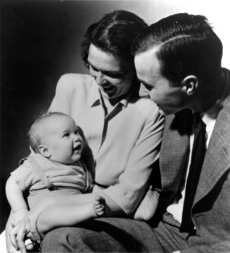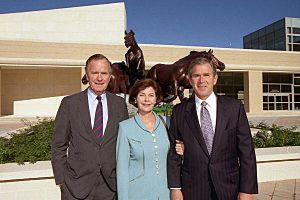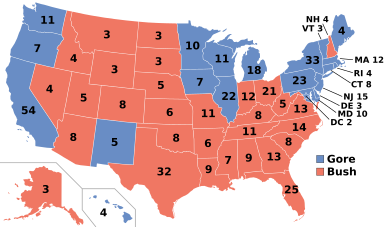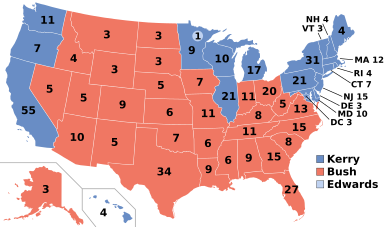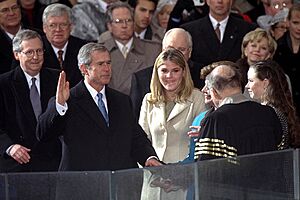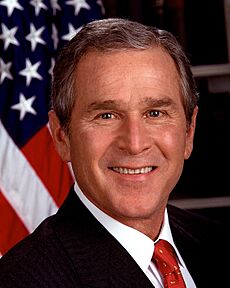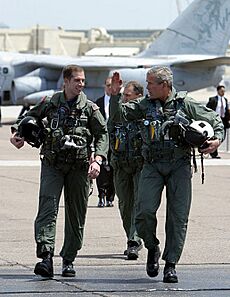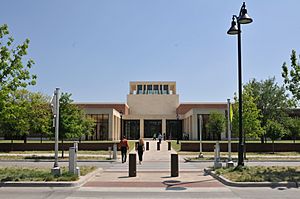George W. Bush facts for kids
Quick facts for kids
George W. Bush
|
|
|---|---|
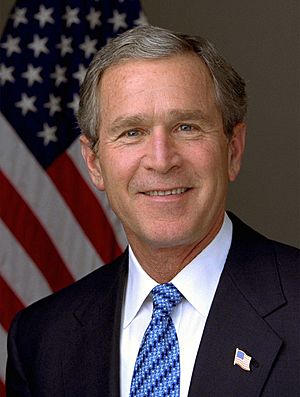
Official portrait, 2003
|
|
| 43rd President of the United States | |
| In office January 20, 2001 – January 20, 2009 |
|
| Vice President | Dick Cheney |
| Preceded by | Bill Clinton |
| Succeeded by | Barack Obama |
| 46th Governor of Texas | |
| In office January 17, 1995 – December 21, 2000 |
|
| Lieutenant |
|
| Preceded by | Ann Richards |
| Succeeded by | Rick Perry |
| Personal details | |
| Born |
George Walker Bush
July 6, 1946 New Haven, Connecticut, U.S. |
| Political party | Republican |
| Spouse |
Laura Welch
(m. 1977) |
| Children | |
| Parents | |
| Relatives | Bush family |
| Education | |
| Occupation |
|
| Civilian awards | Full list |
| Signature |  |
| Website |
|
| Nickname | Dubya |
| Military service | |
| Branch/service |
|
| Years of service | 1968–1974 |
| Rank | First Lieutenant |
| Unit |
|
| Military awards |
|
George Walker Bush (born July 6, 1946) is an American politician and businessman who served as the 43rd president of the United States from 2001 to 2009. He is a member of the Republican Party and the son of the 41st president, George H. W. Bush. Before becoming president, he was the 46th governor of Texas from 1995 to 2000.
As a young man, Bush was a pilot in the Texas Air National Guard. He later earned a business degree from Harvard Business School and worked in the oil industry. He also co-owned the Texas Rangers baseball team. In 1994, he was elected governor of Texas, where he focused on education, criminal justice reform, and tax cuts.
In the 2000 presidential election, Bush defeated Vice President Al Gore in a very close and disputed race. The U.S. Supreme Court made a final decision on the election after a recount in Florida.
The September 11, 2001 terrorist attacks happened early in his first term. This event changed his presidency. He started the war on terror, created the Department of Homeland Security, and ordered the invasion of Afghanistan. He also signed the Patriot Act, a law that gave the government more power to watch suspected terrorists. In 2003, he ordered the invasion of Iraq, believing the country had dangerous weapons. This claim later turned out to be false.
Bush was re-elected in 2004, defeating Senator John Kerry. During his second term, he appointed John Roberts and Samuel Alito to the Supreme Court. He faced major challenges, including criticism for the government's response to Hurricane Katrina and the start of the Great Recession in 2007.
After leaving the White House, Bush returned to Texas. His popularity has improved since his presidency. Historians often rank him in the lower half of U.S. presidents.
Early Life and Education
George Walker Bush was born on July 6, 1946, in New Haven, Connecticut. He was the first child of George H. W. Bush and Barbara Bush. He grew up in Midland and Houston, Texas, with his four siblings: Jeb, Neil, Marvin, and Dorothy. His younger sister, Robin, died of leukemia when she was three.
Bush's father was the 41st U.S. president, and his grandfather, Prescott Bush, was a U.S. senator.
School and University
Bush went to public schools in Texas before attending Phillips Academy, a boarding school in Massachusetts. There, he played baseball and was the head cheerleader.
From 1964 to 1968, he attended Yale University, where he earned a degree in history. He was also a cheerleader and a member of the Delta Kappa Epsilon fraternity. In 1973, he went to Harvard Business School and graduated with a Master of Business Administration (M.B.A.) degree in 1975. He is the only U.S. president to have earned an M.B.A.
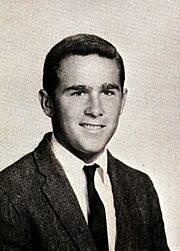
Family and Hobbies
In 1977, Bush married Laura Welch, a schoolteacher and librarian. They have twin daughters, Barbara and Jenna, who were born in 1981. Bush has said that his wife and his Christian faith have been very important in his life.
Bush enjoys reading biographies and histories. He also likes to paint and has created collections of portraits of world leaders, immigrants, and military veterans.
Career Before Politics
Military Service
In May 1968, Bush joined the Texas Air National Guard. He was trained as a pilot and flew Convair F-102 fighter jets. He served until 1974 and was honorably discharged with the rank of First Lieutenant. He is the most recent U.S. president to have served in the military.
Business Ventures
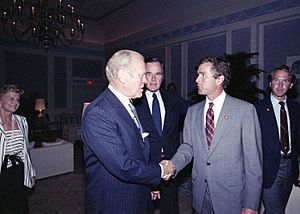
In 1977, Bush started a small oil exploration company called Arbusto Energy. The company later merged with other businesses.
In 1989, Bush became a co-owner and managing general partner of the Texas Rangers baseball team. He was very involved with the team and often sat with fans during games. He sold his share in the team in 1998 for a large profit.
Governor of Texas (1995–2000)
In 1994, Bush ran for governor of Texas against the popular incumbent, Ann Richards. He focused his campaign on welfare reform, crime reduction, and improving education. Bush won the election with 53.5 percent of the vote.
As governor, Bush signed a $2 billion tax cut, the largest in Texas history. He also supported laws that reformed the justice system and set higher standards for schools. He helped Texas become the leading U.S. state in producing electricity from wind power.
In 1998, Bush was re-elected with a record 68 percent of the vote. He was the first Texas governor to be elected to two consecutive four-year terms. His success as governor made him a leading candidate for the presidency.
Presidential Campaigns
2000 Election
Bush ran for president in 2000, describing himself as a "compassionate conservative." He chose Dick Cheney, a former secretary of defense, as his running mate.
The election against Democratic candidate Al Gore was extremely close. The results depended on the state of Florida, where the vote was so tight that it led to a recount. The legal battle went all the way to the U.S. Supreme Court. In the case of Bush v. Gore, the court stopped the recount.
Bush won Florida by just 537 votes. Although Gore won more individual votes nationwide (the popular vote), Bush won the Electoral College with 271 votes to Gore's 266. This made him the 43rd president.
2004 Re-election
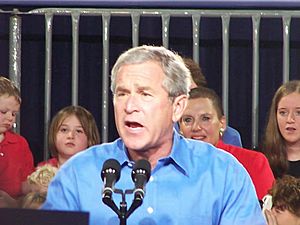
In 2004, Bush ran for a second term against Democratic senator John Kerry. The campaign focused heavily on the ongoing wars in Iraq and Afghanistan and the war on terror. Bush argued that he was the strong leader needed to keep the country safe.
The Bush campaign painted Kerry as a liberal who would raise taxes. They also questioned Kerry's changing positions on the Iraq War.
Bush won the election, this time winning both the Electoral College and the popular vote. He received 286 electoral votes and 50.7 percent of the popular vote.
Presidency (2001–2009)
Bush's presidency was defined by the September 11 attacks. His focus shifted to national security and foreign policy. He also worked on domestic issues like education, healthcare, and the economy.
Domestic Policy
Economic Issues
Bush's first term began during an economic slowdown. He passed major tax cuts in 2001 and 2003, arguing they would help the economy grow. Government spending also increased, especially on the military and homeland security.
The national debt more than doubled during his time in office. The economy grew, but job growth was slow at times. Near the end of his second term, the country entered the Great Recession, a major financial crisis that began in 2007. His administration created programs like the Troubled Asset Relief Program (TARP) to help stabilize the financial system.
Education and Health
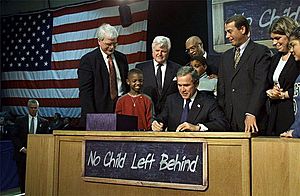
One of Bush's biggest domestic achievements was the No Child Left Behind Act. This law aimed to improve school performance by using standardized testing to measure progress. It passed with support from both Republicans and Democrats.
In 2003, he created the President's Emergency Plan for AIDS Relief (PEPFAR). This program has provided billions of dollars to fight the global AIDS epidemic, especially in Africa. It is credited with saving millions of lives.
He also signed a law creating Medicare Part D, a program to help senior citizens pay for prescription drugs.
Hurricane Katrina
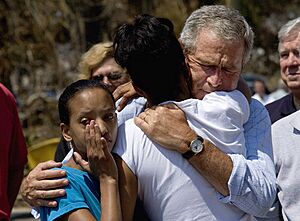
In August 2005, Hurricane Katrina hit the Gulf Coast, causing massive destruction, especially in New Orleans. The government's response to the disaster was slow and disorganized.
Bush and his administration were widely criticized for their handling of the crisis. Many people felt that the government failed to act quickly enough to help those affected. Bush later said he accepted responsibility for the government's failures.
Foreign Policy
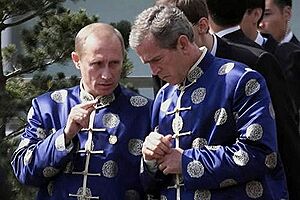
Bush's foreign policy was shaped by the war on terror. He took a strong stance against countries he saw as threats to world peace.
September 11 Attacks
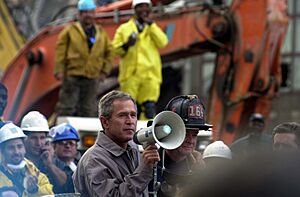
On September 11, 2001, terrorists from the group al-Qaeda attacked the United States. They hijacked four airplanes, crashing two into the World Trade Center in New York City and one into the Pentagon in Virginia. The fourth plane crashed in a field in Pennsylvania after passengers fought back.
The attacks killed nearly 3,000 people. In a speech to the nation, Bush promised a strong response. He declared a "war on terror" and said, "We will not tire, we will not falter, and we will not fail."
War in Afghanistan
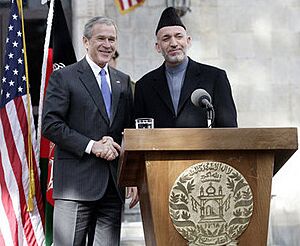
The Taliban government in Afghanistan was protecting Osama bin Laden and al-Qaeda. When the Taliban refused to hand them over, Bush ordered a military invasion.
On October 7, 2001, U.S. and allied forces began military action in Afghanistan. They quickly removed the Taliban from power and helped establish a new government. However, the war continued for many years as U.S. forces fought a long insurgency.
War in Iraq
Bush began to focus on Iraq and its leader, Saddam Hussein. He argued that Iraq had weapons of mass destruction (WMDs) and was a threat to the U.S. and the world.
After diplomatic efforts failed, the U.S. and its allies invaded Iraq on March 20, 2003. The Iraqi army was defeated quickly, and Saddam Hussein's government fell. On May 1, 2003, Bush gave a speech on an aircraft carrier under a banner that read "Mission Accomplished."
However, no WMDs were ever found in Iraq. The country soon fell into a violent insurgency and civil war that lasted for years. The war became very unpopular in the U.S. and around the world. In 2007, Bush ordered a "surge" of more troops to Iraq to help improve security.
Post-Presidency (2009–Present)
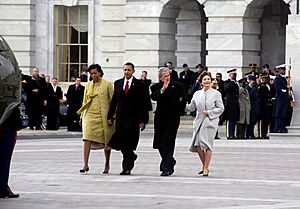
After leaving office in January 2009, George W. Bush and his family returned to Texas. They now live in Dallas. He has mostly stayed out of politics, following a tradition of former presidents not criticizing their successors.
He has focused on his work with the George W. Bush Presidential Center, which includes his presidential library and a public policy institute. He also took up painting and has published books of his portraits.
Bush has worked with other former presidents on humanitarian projects. In 2010, he and Bill Clinton created the Clinton Bush Haiti Fund to help victims of the Haiti earthquake. He has also developed a friendly relationship with Michelle Obama, and they are often seated together at official events.
In 2018, Bush gave a eulogy at the funeral of his father, George H. W. Bush. He continues to make public appearances and speak on issues like military veterans' affairs and global health.
Legacy
George W. Bush's presidency is one of the most debated in modern history. His supporters praise him for protecting the country from another terrorist attack after 9/11. They also point to his successful programs like PEPFAR, which has saved millions of lives from AIDS.
Critics focus on the Iraq War, the government's response to Hurricane Katrina, and the financial crisis of 2008. The failure to find weapons of mass destruction in Iraq remains a major point of criticism.
Historians generally rank Bush in the lower half of U.S. presidents. However, public opinion of him has improved since he left office. Many people now see him as a well-intentioned leader who faced some of the nation's greatest challenges.
See also
 In Spanish: George W. Bush para niños
In Spanish: George W. Bush para niños


